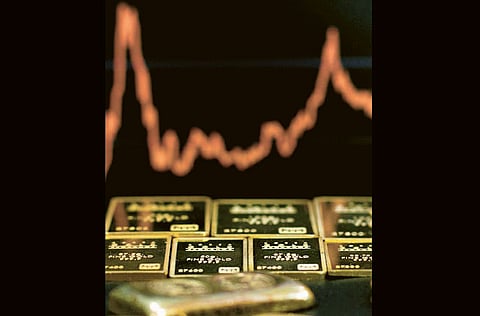Speculation can fade gold's sheen
There is no doubt that gold is the safest asset in times of crisis

There is no doubt that gold is the safest asset in times of economic crisis, political tension and financial turmoil.
But in reality, the feverish dealings in the gold market today is not the result of investors searching for safe channels for their investments to avoid speculation of the kind associated with financial markets.
Before going into details, I would like to point out two important facts that have set the gold trade apart during the past few months.
The first is that gold increased from $445.00 an ounce in 2005 to over $1,900 per ounce lately. This coincides with a drop in demand of 17 per cent in the second quarter of 2011, in comparison to the same period last year, according to International Gold Council data. This percentage is high and it should have contributed to stabilising prices at the least rather than pushing them higher.
The second point is that currency and gold bullion purchases are regressing in Europe and the US, whereas they are picking up in China and India. This is despite the fact that American and European investors are in dire need of safe investment channels because of the debt crisis and the drop in stocks and bond prices in their markets.
Growth rebalancing
Some explanation for this can be gleaned from the fact that investment capacity is falling in the West and growing in the East. But that is not enough to explain the regression taking place in the demand for gold in the Atlantic region, and its rise in Asia, which is also achieving the highest growth rates in the world.
From there two trends mentioned in the International Gold Council's report, we may deduce that the gold ‘bubble' will not prevail for long. Gold prices which have shot up during the past few years, especially since the economic crisis of 2008, will be pushed higher to reach $2000 an ounce, as indicated in some reports, before sliding down again.
Media role
The bubble phenomenon increased in the post- Cold War era, when the world became more oriented towards the service economy that depends on financial transactions, especially in the West.
The last decade alone witnessed three consecutive bubbles, starting with the stock price bubble that inflate assets in financial securities; followed by the real estate bubble; and ending with the collapse of Lehman Brothers in December 2008.
Speculation forms one of the most important foundations of the service economy, which is based on inflating assets.
Today's gold speculators headed towards oil after the financial and real estate market bubbles ended. Oil on the other hand is controlled by complex considerations because the Organisation of Petroleum Exporting Countries (Opec) exists as a major player in the international oil market.
The media — as before — had a distinct and important role in generating convictions and encouraging swift purchase and selling operations for outrageous profits. It started with a rush to buy gold from central banks. Then the media pointed out that — despite the fact that gold had surpassed the $1,900 per ounce — this price is beneath the real value of gold.
This means that, despite the price, it is still being traded for less than its real value.
At the same time, a number of experts and decision-makers fed the media with exaggerated news and expectations. They also wrote unrealistic reports that serve a certain investment group.
This fact has been outlined by a number of neutral academics and researchers in Europe and the US after several committees were set up to evaluate the reasons behind crises and previous ‘bubbles'.
As painful as the bursting of the previous gold bubble was, the coming one will be equally agonising. Its repercussions will affect the investments of many countries, especially establishments which purchased huge quantities of gold for high prices.
Investing in gold is golden advice. But this investment has to be done in a professional manner, away from speculation and artificial bubbles. This calls for both governments and investors to be very careful in the immediate future.
It is very difficult to break speculation dinosaurs because of their wide experience, financial strength, and their access to the media and decision-making centres in advanced countries.
Dr Mohammad Al Asoomi is a UAE economic expert and specialist in economic and social development in the UAE and the GCC countries.



